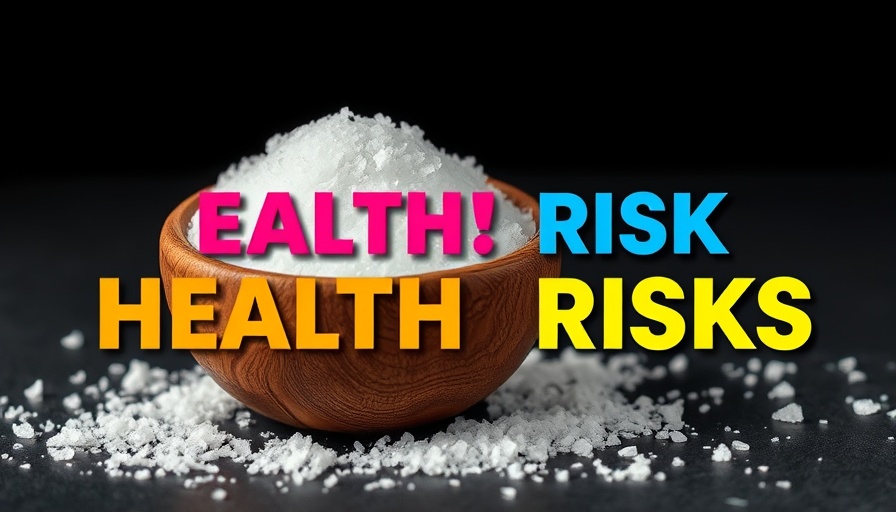
How the Modern Diet Affects Blood Pressure in Seniors
As we age, our bodies undergo significant changes that can affect our health in various ways. One key area is our blood pressure, which often becomes a point of concern, particularly after the age of 60. In a recent insightful analysis inspired by the video ‘Japanese Oldest Doctor: Never Eat This If You Have High Blood Pressure’, we delve into the often-overlooked culprits that contribute to hypertension in seniors. The narrative of longevity is not solely about what we eat more of, but about becoming mindful of what we can eliminate from our diets.
In 'Japanese Oldest Doctor: Never Eat This If You Have High Blood Pressure', the discussion dives into the connection between processed food and hypertension, exploring key insights that sparked deeper analysis on our end.
The Hidden Risks of Ultraprocessed Foods
Dr. Hinhara, Japan's longest-living doctor, emphasizes the importance of avoiding ultraprocessed foods. These foods are not just detrimental due to their salt content, but because they contain harmful preservatives and chemicals that can strain the kidneys. Studies reveal that individuals consuming higher amounts of ultraprocessed foods face a staggering 15% increased risk of developing high blood pressure, regardless of their overall salt intake. This means that it’s not simply the amount of sodium we consume; rather, it's the sources from which it comes that play a crucial role in our health.
Your Kidneys and Age: Understanding the Changes
After the age of 60, our kidneys lose precision in filtering as they age, akin to using a worn-out coffee filter. They become less capable of managing excess sodium, leading to higher blood pressure and swelling in the limbs. This biological change signifies that what was once manageable in our younger years may no longer apply as we age. By replacing ultraprocessed foods with simple, nutrient-rich options like miso soup or grilled vegetables, seniors can see an immediate, positive impact on their blood pressure.
The Emotional Impact: Finding Peace in Simplicity
Changing dietary habits doesn't only have physiological benefits; it also has a profound emotional impact. One senior shared a powerful experience after making simple dietary swaps. Not only did her blood pressure improve, but she also expressed feeling 'lighter' both physically and mentally. It highlights the deep connection between our food choices and overall well-being, emphasizing that food should be nourishing on multiple levels.
Real Conversations About Sodium Intake
After implementing a plan to track sodium consumption, one woman discovered she was ingesting over 4,000 mg a day, far surpassing the recommended limit. She realized that even labeled 'healthy' foods could wreak havoc on her health. By returning to the basics and cooking at home with whole ingredients, she successfully managed her sodium and improved her health outcomes. It's crucial for seniors to revisit the labels of their trusted foods and make mindful choices.
Pressure: More Than Just Blood Pressure
Stress and anxiety can also take a toll on heart health. Cortisol, known as the stress hormone, can stay elevated in our systems, contributing to hypertension. Many seniors may find their pressure spikes not just from their food but from stressors in their daily life. Encouraging mindfulness techniques and stress management practices becomes essential for promoting heart health.
Creating a Connection with Food and Body
Food is more than sustenance. After 60, our bodies crave a gentler touch. Opting for familiar, traditional foods can ease the transition and promote balance. By recognizing the signals from our bodies—like swelling or fatigue—we can adapt our diets accordingly. Choosing items like fresh fruits, vegetables, and wholesome grains instead of packaged meals can restore harmony within and promote longevity.
The beauty of aging lies in the accumulated wisdom. As we learn to listen to our bodies, we can create peaceful interactions with food, leading to healthier choices and a vibrant life. It’s not just about restriction; it’s about creating a nourishing relationship with what we eat.
Conclusion: A Call for Mindfulness
It's time to take charge of our health by making conscious decisions about what we add or remove from our diets. Reflect on your kitchen pantry and challenge yourself: is there one ultraprocessed food item you're ready to let go of? Simple actions like these can lead to profound health benefits. Embrace the journey of healthy aging today—your body will thank you.
 Add Element
Add Element  Add Row
Add Row 



Write A Comment